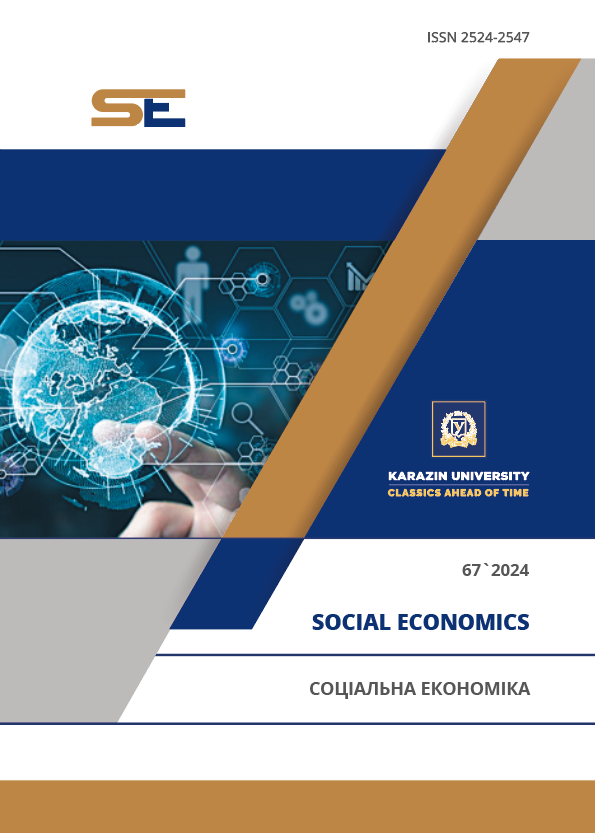MARKETING AUDIT AS A TOOL OF MARKETING ANALYTICS
Abstract
The article systematizes the existing approaches to the interpretation of the concept of «marketing audit». In particular, scientists study marketing audit depending on the analysis process, research method, analysis tool, content of marketing diagnostics, management process. In addition, the factors that have a significant impact on the definitions of «marketing audit» are identified: speed of change, digital transformation, customer focus, integrated approach, data analysis.
Based on the generalization of approaches to the interpretation of the concept of «marketing audit» and factors that have a significant impact on this concept, it is proposed to define marketing audit as an improved tool used by companies for in-depth analysis of their marketing activities in order to identify opportunities for increasing efficiency and competitiveness. A marketing audit is not only an analysis of a company’s marketing strategies and actions, but also a systematic review of its marketing activities taking into account changing market conditions and internal factors.
Taking into account the peculiarities of today’s situation in Ukraine, the article defines the actual tasks of marketing audit as an element of marketing analytics. The characteristic features of marketing audit are also formed: completeness, systematicity, independence, regularity. It was determined that marketing audit has a positive effect on marketing analytics.
In the article, special attention is paid to distinguishing cases in which it is advisable to conduct a marketing audit immediately, that is, in the case of a change in the assortment, in the event of a significant increase in sales volumes, insufficient information about the market or vice versa, and in cases of impossibility to plan purchases and predict financial results in the absence of appropriate information.
Downloads
References
Butynets’, T. A. (2015). Marketynhovyy audyt: vidminnosti u traktuvanni. Problemy teoriyi ta metodolohiyi bukhhalters’koho obliku, kontrolyu i analizu, 3(33), 3-16. Retrieved from http://eztuir.ztu.edu.ua/123456789/2525 (in Ukrainian)
Mykhal’chyshyna, L.H., & Yaroslavs’kyy, A.O. (2013). Marketynhovyy audyt: sutnist’, zavdannya, perspektyvy rozvytku. Ekonomichni nauky, 10(3), 513-519. Retrieved from http://nbuv.gov.ua/UJRN/etsnof_2013_10(3)__85 (in Ukrainian)
Mandych, O. V., Babko, N. M., & Spivak, S. I. (2019). Reinzhynirynh biznes-protsesiv pry formuvanni marketynhovoyi ta lohistychnoyi diyal’nosti intehrovanykh pidpryyemstv. Ukrayins’kyy zhurnal prykladnoyi ekonomiky, 4, 402-410. doi: https://doi.org/10.36887/2415-8453-2019-4-4 (in Ukrainian)
Khablyuk, O., Yatsyshyn, S., & Holyash, I. (2019). Marketynhovyy audyt yak instrument otsinyuvannya efektyvnosti biznesu. Halyts’kyy ekonomichnyy visnyk Ternopil’s’koho natsional’noho tekhnichnoho universytetu, 60(5), 129–136. doi: https://doi.org/10.33108/galitsianvisnyk_tntu2019.05.129 (in Ukrainian)
Kumar, V., Dixit, A., Javalgi, R. G., & Dass, M. (2016). Research framework, strategies, and applications of intelligent agent technologies (IATs) in marketing. Journal of the Academy of Marketing Science, 44, 24–45. doi: https://doi.org/10.1007/s11747-015-0426-9
Zierau, N., Hildebrand, C., Bergner, A., Busquet, F., Schmitt, A., & Leimeister J., M. (2023). Voice bots on the frontline: Voice-based interfaces enhance flow-like consumer experiences & boost service outcomes. Journal of the Academy of Marketing Science, 51(4), 823-842. doi: https://doi.org/10.1007/s11747-022-00868-5
Yoo, K., Welden, R., Hewett, K., Haenlein, M. (2023). The merchants of meta: A research agenda to understand the future of retailing in the metaverse. Journal of Retailing, 99 (2), 173-192. doi: https://doi.org/10.1016/j.jretai.2023.02.002
Feshchur, I. et al. (2023). Marketing Audit as a Tool for Assessing Business Performance. Theoretical and Practical Research in Economic Fields, 14(2), 438-456. doi: https://doi.org/10.14505/tpref.v14.2(28).21
Berndt, R., Fantapie Altobelli, C., & Sander, M. (2023). International Marketing Audits. International Marketing Management, 465-471. doi: https://doi.org/10.1007/978-3-662-66800-9_14
Chmil, H., & Verzilova, H. (2020). Theoretical aspects of organizing a marketing audit at a trading company. Institute of Accounting, Control and Analysis in the Conditions of Globalization, 1(1), 89-97. doi: https://doi.org/10.35774/ibo2020.01.089
De Bruyn, A., Viswanathan, V., Beh, Y., Brock, J. K. U., & Von Wangenheim, F. (2020). Artificial intelligence and marketing: Pitfalls and opportunities. Journal of Interactive Marketing, 51(1), 91-105. doi: https://doi.org/10.1016/j.intmar.2020.04.007
Lim, W. M. (2023). Transformative marketing in the new normal: A novel practice-scholarly integrative review of business-to-business marketing mix challenges, opportunities, and solutions. Journal of Business Research, 160. doi: https://doi.org/10.1016/j.jbusres.2022.113638
Guliyev, F. V. (2022). Marketing audit in efficiency of marketing in the food industry. Marketing and Management of Innovations, 2(1), 161-170. doi: https://doi.org/10.21272/mmi.2022.2-15
Krafft, M., Sajtos, L., & Haenlein, M. (2020). Challenges and opportunities for marketing scholars in times of the fourth industrial revolution. Journal of Interactive Marketing, 51(1), 1-8. doi: https://doi.org/10.1016/j.intmar.2020.06.00
Verzilova, H. (2020). Improvement of the approach to the development of marketing activity audit methods. Economic Strategy and Prospects for the Development of Trade and Services, 1(31), 50-62. doi: https://doi.org/10.5281/zenodo.3932715
Hakimovna, U. M., & Muhammedrisaevna, T. M. S. (2022). Audit and Marketing Audit in Small Business and Private Entrepreneurship: The Order and Process of Inspection. Journal of Ethics and Diversity in International Communication, 2(3), 84-88. Retrieved from https://uniwork.buxdu.uz/resurs/12928_1_1DFDA83D6EFACDFB8B91B284C5189188931EF170.pdf
Gryshchenko, I., Kruhlov, V., Lypchuk, O., Lomaka, I., & Kobets, Yu. (2022). Infrastructural development of smart cities as the background of digital transformation of territorial units. Cuestiones Políticas, 40(73), 233-250. doi: https://doi.org/10.46398/cuestpol.4073.11
Tien, N. H., Phu, P. P., & Chi, D. T. P. (2019). The role of international marketing in international business strategy. International Journal of Research in Marketing Management and Sales, 1(2), 134-138. doi: https://doi.org/10.33545/26633329.2019.v1.i2b.27
Cancino Gomez, Y. A., Torres Palacios, J. P., Bautista Rodriguez, Y. M., & Palacio Rozo, J. J. (2021). Determination of evaluation variables for the marketing audit associated with the objective traceability model. Revista Venezolana de Gerencia, 26(96), 1413-1434. doi: https://doi.org/10.52080/rvgluz.26.96.26
Sangkala, M. (2023). The role of marketing audit in Yotta beverage business in Makassar. Pettarani Branch. Economics and Business Journal (ECBIS), 1(4), 453-464. doi: https://doi.org/10.47353/ecbis.v1i4.55
Kryshtanovych, M., Akimova, L., Akimov, O., Kubiniy, N., & Marhitich, V. (2021). Modeling the process of forming the safety potential of engineering enterprises. International Journal of Safety and Security Engineering, 11(3), 223-230. doi: https://doi.org/10.18280/ijsse.110302
Tolstoy, D., Nordman, E. R., & Vu, U. (2022). The indirect effect of online marketing capabilities on the international performance of e-commerce SMEs. International Business Review, 31(3). doi: https://doi.org/10.1016/j.ibusrev.2021.101946




